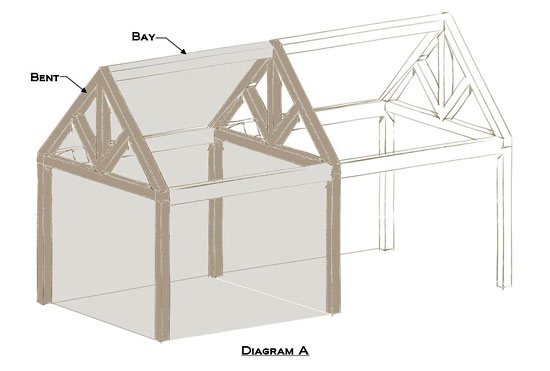This will the first point of the rafter measurement line using the results of your rafter length calculation measure from this point along the rafter measurement.
Framin fivevplaned bay roof.
The three primary variables to consider when designing the eaves for a gable roof are the width of the gable trim the projection of the eaves and the details at the corner of the gable ends.
Stick truss roof framing.
Overhangs hips and dormers add greatly to the complexity of the framing.
These hip rafters run at a 45 angle from each corner of the building to the ridge.
Supporting brick veneer on steel angles bolted to the framing rather than providing masonry bearing all the way to the foundation is approved by code but it s important to get the details right to avoid unsightly cracks and other more serious structural problems.
The hip roof has four sloping sides.
Nearly all roofs are framed using one of two methods.
A disadvantage of the hip roof is that it is more difficult to construct than a gable roof.
While most home builders will outsource the construction of roofing trusses the rafter supports of the roof itself learning to frame a roof yourself is one of the true arts of carpentry and a basic primer is covered below.
It is the strongest type of roof because it is braced by four hip rafters.
Detailed flat to pitched roof conversion costs.
Framing a roof is the last step in framing new construction.
Intersecting the intersecting roof consists of a gable.
Roof framing rafter layout.
Converting a flat roof to a pitched roof is essentially framing a new roof for an average of 6 to 9 per square foot.
The rise or height of the roof at its peak is the altitude of the triangle.
The heavier the roof and the more snow weight it will need to support the closer together the load bearing rafters or trusses need to be.
And the line length measurement from the roof peak to the building wall is the hypotenuse.
Converting a flat roof to pitched.
Standard stick framing or the newer truss framing.
Learn more about gable end eave design here.
The run or half the building span is the base of the triangle.















































